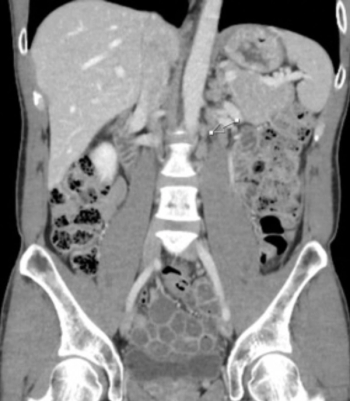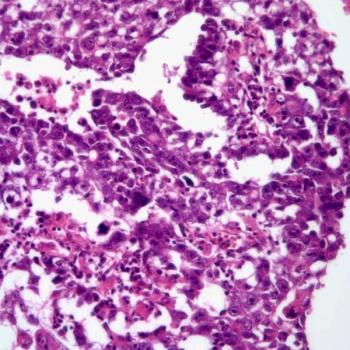
Oncology NEWS International
- Oncology NEWS International Vol 12 No 7
- Volume 12
- Issue 7
Fatigue Studies Provide Model for Evidence-Based Nursing Practice
DENVER, Colorado-Evidencebasedclinical practice has become a hottopic in the current nursing community.Victoria Mock, DNSc, RN, recipient ofthe 2003 Distinguished Researcher Award,related her group’s experience in helpingto develop evidence-based fatigue managementinterventions that have now becomepart of nursing practice. Director ofnursing research at the Kimmel ComprehensiveCancer Center at Johns HopkinsHospital in Baltimore, Dr. Mock has thedistinction of being the only nurse tochair a National Comprehensive CancerNetwork (NCCN) clinical guidelines panel(the committee that developed the firstNCCN guidelines on cancer-related fatigue).
DENVER, Colorado--Evidence-based clinical practice has become a hot topic in the current nursing community. Victoria Mock, DNSc, RN, recipient of the 2003 Distinguished Researcher Award, related her group's experience in helping to develop evidence-based fatigue management interventions that have now become part of nursing practice. Director of nursing research at the Kimmel Comprehensive Cancer Center at Johns Hopkins Hospital in Baltimore, Dr. Mock has the distinction of being the only nurse to chair a National Comprehensive Cancer Network (NCCN) clinical guidelines panel (the committee that developed the first NCCN guidelines on cancer-related fatigue).
Evidence-Based Practice
Evidence-based practice has been defined as care that integrates the best scientific evidence with clinical expertise, knowledge of pathophysiology and psychosocial issues, and the decision-making preferences of patients. Beginning with the identification of a clinical problem for which there is no readily noted effective treatment, "we conduct research to address the problem, synthesize the scientific evidence and then integrate it with clinical expertise and other expert knowledge, and develop clinical practice guidelines," explained Dr. Mock. The guidelines are implemented, evaluated, revised as new knowledge is developed, and then used to guide clinical practice.
The Oncology Nursing Society identified fatigue as a research priority in 1991. The first national practice guidelines were published by NCCN in 2000 and were revised this year by the cancer-related fatigue practice guidelines panel. These guidelines are beginning to be implemented and evaluated.
Fatigue: Defining the Problem
The NCCN guidelines define cancerrelated fatigue as a persistent, subjective sense of tiredness related to cancer or cancer therapy. Cancer-related fatigue interferes with usual functioning. It is the most common unmanaged symptom of cancer reported by patients across the disease trajectory, and the problem has increased with the use of more multimodality and intensive treatment regimens. In addition, there are few proven treatments for cancer-related fatigue.
According to Dr. Mock, fatigue is a basic protective mechanism, like pain, and it serves to prevent damage to the organism. Cancer patients have additional energy demands placed upon them, such as to repair healthy tissues that are damaged by chemotherapy and irradiation. They also have decreased energy resources because of anorexia, nausea, vomiting, and diarrhea or changes in energy mechanisms, such as the damage inflicted on mitochondria as a result of irradiation and chemotherapy.
Cancer patients have accepted fatigue as normal and expected, Dr. Mock admitted, and caregivers often do not screen fordosing for epoetin alfa is 150 IU/kg, and 40,000 U per week is the common practice. For darbepoetin, the dose is 2.25 μg/ kg per week. Several studies, however, arelooking at novel dosing schedules, including starting epoetin alfa at 60,000 IU per week and darbepoetin at 4.5 μg/kg per week, Dr. Nail noted.
"
The use of higher initial starting doses may lead to earlier identification ofnonresponders and to a more rapid rise in hemoglobin," she reported. Because dose escalation is an issue, starting at 60,000 IU solves the problem of waiting to escalate the dose.
Early intervention and prophylactic use of these agents also are being studied, with some investigators considering epoetin alfa at the start of chemotherapy or prior to chemotherapy in high-risk patients. In a study by Straus et al. reported in 2002, early treatment with epoetin alfa (initiated at hemoglobin levels between 10 and 12 g/dL) resulted in significant improvements in Functional Assessment of Cancer Therapy- Anemia (FACT-An) scores compared with baseline, fewer clinic visits compared with those of control patients, and a decreased number of days in which patientsrequired assistance with daily activities.
Some of the controversy surrounding the timing of intervention for anemia involves the existence of two sets of conflicting national guidelines. The American Society of Hematology (ASH)/American Society of Clinical Oncology (ASCO) guidelines set the initiation point at up to 10 g/dL, whereas the National Comprehensive Cancer Network (NCCN) guidelines advise intervening at less than 11 g/dL. Research indicates that quality of life and functional ability decline at hemoglobin levels of 12 g/dL or less.
The prognostic significance of hemoglobin levels has been explored. In a metaanalysis published in 2001, researchers found that anemia increased the risk of death by 75% in patients with head and neck cancers, 67% in patients with coloncancer, 47% in patients with prostate cancer, and 19% in patients with lung cancer. Anemia is associated with shorter survival times, concluded Dr. Nail. Similar associations between hemoglobin level and therapeutic response or survival have been found in studies of cervical cancer, non- small-cell lung cancer, and metastatic testicular cancer.
Improved Survival
"Potential benefits of epoetin alfa go beyond anemia correction," reported Andrea M. Barsevick, DNSc, RN, director of nursing research and education at the Fox Chase Cancer Center in Philadelphia. Improved survival, attenuation or prevention of cognitive dysfunction, and perhaps neuroprotection are possible effects. These findings, however, were based on many tentative, hypothesis-generating studies, not confirmatory research ready for clinical application, Dr. Barsevick cautioned. In one retrospective study of data from a clinical trial performed by Glaser from 1989 to 1998, study participants consisted
Articles in this issue
over 22 years ago
MRI Detects Missed Breast Cancers in High-Risk Patientsover 22 years ago
Adjuvant Chemotherapy Improves Lung Ca Survivalover 22 years ago
Combination Delays Breast Ca Progressionover 22 years ago
Primary Hypothyroidism Linked to Reduced Risk of Breast CaNewsletter
Stay up to date on recent advances in the multidisciplinary approach to cancer.






































